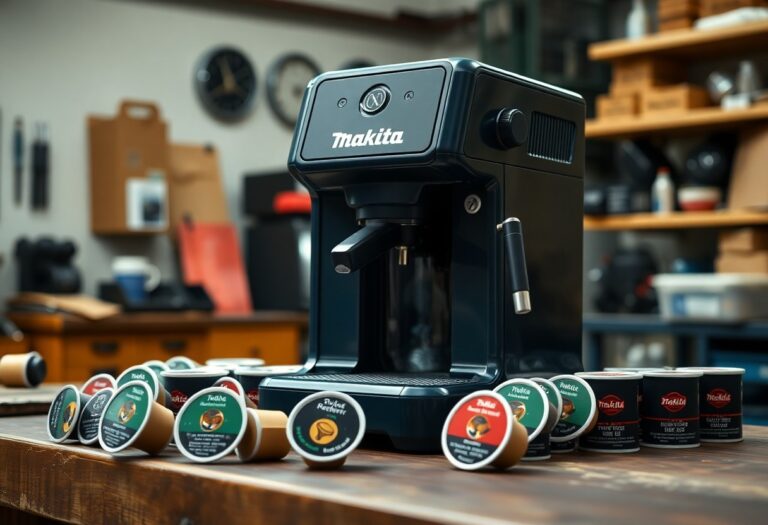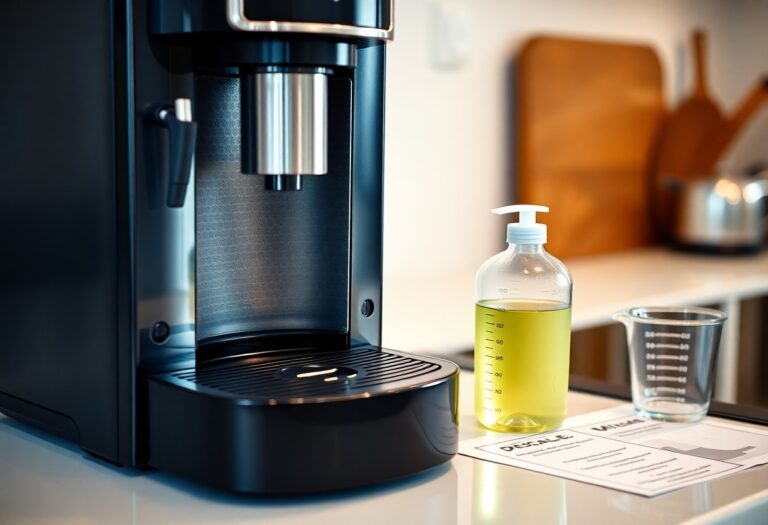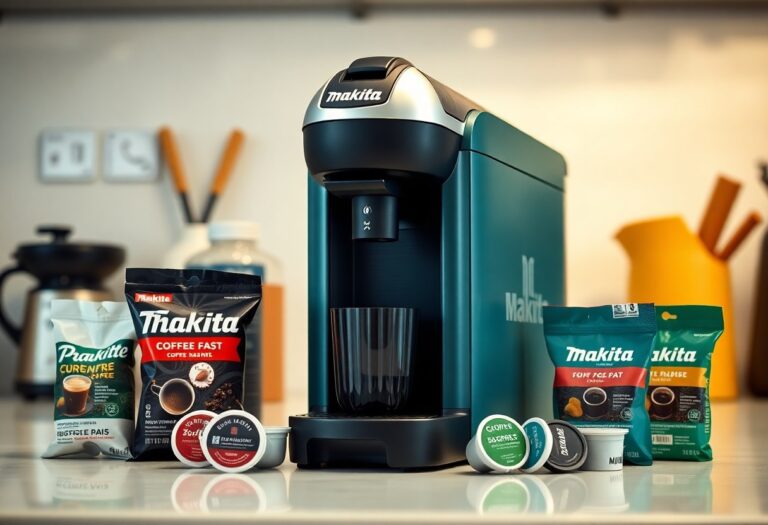What Can Be Used to Descale a Coffee Machine – Descaling Agents
Agents that are effective in descaling your coffee machine include various household items and commercial products. Using vinegar or citric acid are popular eco-friendly options that help remove mineral buildup without harsh chemicals. However, it’s vital to avoid using bleach or any abrasive cleaners, as they can damage your machine. For those seeking convenience, commercial descaling solutions are specifically formulated to effectively clean and protect your appliance. Regular descaling ensures your coffee tastes great and extends the life of your coffee maker.
Key Takeaways:
- Common descaling agents include white vinegar, citric acid, and commercial coffee machine descalers, each with their specific benefits.
- White vinegar is a natural and cost-effective option, though it may require multiple rinses to eliminate the odor and taste.
- Citric acid is another natural alternative that effectively dissolves mineral buildup without leaving strong odors.
- Commercial descalers are specially formulated for coffee machines and typically provide the best results, ensuring optimal performance and longevity.
- Frequency of descaling varies based on water hardness and machine use, but performing it regularly is important for maintaining coffee quality and machine efficiency.

Vinegar vs. Commercial Descalers: The Showdown
The ongoing debate between vinegar and commercial descalers presents valid arguments for both sides. Vinegar, often praised for its natural acidity and cost-effectiveness, can effectively dissolve mineral buildup. In contrast, commercial descalers are formulated specifically to tackle tough scale, generally providing quicker and sometimes more effective results. Understanding the pros and cons of each choice will empower you to make the right selection for your coffee machine maintenance.
The Science Behind Vinegar as a Descaling Agent
Vinegar contains acetic acid, which reacts with the mineral deposits in scale, particularly calcium carbonate. This natural reaction efficiently breaks down buildup in your coffee machine, providing an easy-to-source and eco-friendly solution. Utilizing vinegar not only saves you money, but it also avoids the use of harsh chemicals found in some commercial products, making it a suitable choice for those valuing sustainability.
How Commercial Descalers Measure Up
Commercial descalers typically feature stronger acids, such as citric or sulfamic acid, designed for rapid removal of limescale. These products not only act faster than vinegar but also target specific kinds of mineral deposits. Moreover, many commercial options include additives that can enhance your coffee machine’s longevity while ensuring a thorough clean. Choosing one of these products might yield better results if your machine has significant scaling or if you’re short on time.
Commercial descalers often come with detailed instructions tailored for specific coffee machine brands, ensuring compatibility and effectiveness. The formulations are crafted to dissolve a broad spectrum of scale deposits efficiently, making them particularly advantageous for machines with heavy buildup. Additionally, these products may include protective agents, which shield internal components during the descaling process, thus providing a more comprehensive cleaning experience than vinegar alone could achieve.

Citric Acid: The Unsung Hero of Descaling
Citric acid, a natural compound found in citrus fruits, is often overlooked as a powerful descaling agent for coffee machines. Its effectiveness lies in its ability to dissolve mineral deposits, such as calcium and limescale, which can accumulate over time. As a non-toxic, biodegradable alternative, citric acid not only keeps your coffee machine running smoothly but also ensures that your coffee retains its rich flavor without unwanted chemical residues.
The Chemistry at Play with Citric Acid
Citric acid functions by chelating calcium ions, which means it binds these minerals and helps release them from surfaces. This process increases the solubility of calcium carbonate, making it easier to remove buildup in your coffee machine. The reaction yields carbon dioxide and other less harmful byproducts, minimizing any environmental impact and enhancing the efficiency of your descaling routine.
Pros and Cons of Using Citric Acid for Descaling
Pros and Cons of Using Citric Acid for Descaling
| Pros | Cons |
|---|---|
| Natural and non-toxic | Less effective on heavy limescale |
| Biodegradable | Requires multiple applications for stubborn buildup |
| Cost-effective | Can leave a citrus scent if not rinsed properly |
| Widely available | May require dilution for optimal use |
| Simple preparation method | Not all coffee machines recommend it |
Choosing citric acid as a descaling agent offers great benefits, primarily due to its natural and safe composition. Its cost-effectiveness and ease of availability make it a convenient option for regular maintenance. However, it may fall short in tackling severe limescale buildup compared to stronger commercial alternatives. Multiple applications might be necessary, and if not rinsed thoroughly, you might notice a lingering citrus smell. Therefore, while citric acid is a commendable option, assess your specific needs and the condition of your coffee machine before committing to it.
Baking Soda: A Common Household Solution
Baking soda, or sodium bicarbonate, serves as a versatile household solution not just for baking but also for descaling your coffee machine. Due to its mild alkalinity, it can effectively neutralize acidic deposits found in water systems, making it a popular and economical choice for maintenance. A simple paste of baking soda and water can work wonders on stubborn limescale buildups, ensuring your coffee machine continues to function optimally without the harsh chemicals found in commercial products.
The pH Balance and Its Effectiveness
The pH level of baking soda, approximately 9, provides an effective environment to combat acidic residues in coffee machines. This alkaline nature allows it to react with calcium deposits and dissolve them gradually. By balancing the pH, baking soda effectively converts hard mineral buildup into a more soluble form, making it easier to rinse away and enhance your machine’s performance.
Comparisons to Traditional Descalers
Baking soda offers a gentler alternative to traditional descalers. While commercial descalers often contain strong acids meant to aggressively attack limescale, they can sometimes cause corrosion or damage to your machine. In contrast, baking soda’s mild formulation minimizes the risk of harm, making it a safer choice for regular maintenance that still delivers satisfactory results without the fear of damage.
Comparison of Baking Soda and Traditional Descalers
| Baking Soda | Traditional Descalers |
|---|---|
| Mildly alkaline, safe for regular use | Strong acids, can be harsh on machines |
| Cost-effective and environmentally friendly | Often contains toxic chemicals |
| Minimizes risk of damage | Can cause corrosion if misused |
Baking soda is not only an affordable and readily available option, it also provides peace of mind when it comes to machine care. In contrast to traditional descalers that rely on potent acids for effectiveness, utilizing baking soda mitigates potential machine damage while still assisting in limescale removal. Opting for baking soda ensures that you maintain the longevity of your coffee machine without sacrificing cleanliness or performance.
Alternative Natural Descalers: Nature’s Remedies
Exploring alternative natural descalers can lead you to effective and eco-friendly options for maintaining your coffee machine. These remedies not only reduce limescale buildup but also offer the peace of mind that comes from using non-toxic ingredients. With simple pantry items at your disposal, you can reroute from harsh chemicals to approaches that are gentler on your coffee maker and the environment. Two popular natural descalers include lemon juice and cream of tartar, each presenting unique benefits for descaling tasks.
Lemon Juice and Other Citrus Variants
Lemon juice is well-known for its effective acidity and pleasant scent, making it a popular choice for descaling coffee machines. The citric acid in lemon juice can dissolve limescale buildup and mineral deposits quickly. Just mix equal parts lemon juice and water, run it through your machine, and follow with a thorough rinse to enjoy not only a clean machine but also subtly flavored coffee. Other citrus variants like orange or lime juice can equally contribute to this descaling process, providing variety and natural freshness.
The Efficacy of Cream of Tartar
Cream of tartar, a byproduct of wine fermentation, serves as a versatile kitchen staple that can double as a natural descaler. Its mild acidity makes it effective at breaking down mineral deposits without damaging your coffee machine. You can create a simple descaling solution by mixing 1 to 2 tablespoons of cream of tartar with water, running it through your machine, followed by a full rinse cycle to prevent any lingering taste. Your coffee maker will be restored to its former glory, ensuring a fresher brew every time.
Using cream of tartar for descaling not only helps to remove limescale but also has the added benefit of not introducing harsh chemicals into your machine. This naturally occurring substance has been utilized in various culinary practices, showcasing its safety and effectiveness. By incorporating cream of tartar, you contribute to a gentle approach towards your coffee maker’s maintenance, ensuring longevity while enjoying minimal environmental impact. Embracing this method creates a simple and efficient routine for preserving your coffee experience.
Choosing the Right Descaling Agent for Your Machine
Selecting the appropriate descaling agent hinges on the specific requirements of your coffee machine. Different machines are designed with varied materials, and using a descaler not intended for your device could lead to serious damage. Always refer to the manufacturer’s guidelines to ensure compatibility and effectiveness. For alternatives, you can explore what can I use to clean my machine as a substitute for …. Experimenting without proper research can lead to undesirable effects on your brewing apparatus.
Compatibility with Different Coffee Machines
Before proceeding with descaling, verify whether the agent is suitable for your machine’s material and design. For instance, while stainless steel machines typically handle citric acid well, aluminum components might react negatively. Some manufacturers provide proprietary descalers made specifically for their models, ensuring safe and effective cleaning.
Environmental and Health Impacts of Various Agents
The choice of descaling agent influences not only the longevity of your coffee machine but also the environment and your health. Many commercial agents contain harsh chemicals that can emit toxic fumes. Opting for eco-friendly alternatives, like vinegar or citric acid, minimizes these risks while promoting sustainability in your coffee routine.
Commercial descalers often contain corrosive substances that can be harmful to both your brewing machine and the environment. Ingredients such as sulfuric acid or phosphoric acid can contribute to air and water pollution during disposal. In contrast, natural descalers, like vinegar or citric acid, present a safer option for households, lessening any negative impact you might have on your surroundings while ensuring a clean machine. Choosing environmentally friendly agents preserves the integrity of your coffee experience and safeguards your well-being.
Final Words
Drawing together the various options for descaling your coffee machine, you have a variety of effective descaling agents at your disposal. Whether you choose commercial descalers, white vinegar, or citric acid, each option can effectively combat mineral buildup to enhance your machine’s performance and lifespan. It’s crucial to follow the manufacturer’s guidelines for frequency and method of descaling to keep your coffee tasting fresh and your machine running smoothly. Regular descaling ensures your daily brew remains a delightful experience.
FAQ
Q1: What is a descaling agent and why is it important for my coffee machine?
A: A descaling agent is a solution used to remove mineral build-up, particularly calcium carbonate, from the internal components of coffee machines. Over time, hard water can cause limescale to accumulate, affecting the performance and taste of your coffee. Regular descaling helps maintain your machine’s efficiency, extends its lifespan, and ensures that your beverages taste their best.
Q2: What types of descaling agents can I use on my coffee machine?
A: There are several types of descaling agents available, including commercial descaling solutions specifically formulated for coffee machines, white vinegar, and citric acid. Each of these options can effectively dissolve mineral buildup. However, it’s important to consult your coffee machine’s user manual to find if a specific agent is recommended or required to avoid damaging your appliance.
Q3: How do I safely use a descaling agent in my coffee machine?
A: To use a descaling agent, first empty the water reservoir of your coffee machine. Then, mix the descaling solution with water according to the manufacturer’s instructions. Pour the solution into the water reservoir and run a brewing cycle without coffee to allow the descaling agent to circulate through the system. After the cycle, rinse with fresh water by running several brew cycles with clean water to ensure no residue remains.
Q4: How often should I descale my coffee machine?
A: The frequency of descaling depends on the hardness of your water and how often you use your coffee machine. As a general guideline, it is recommended to descale every 1-3 months. If you notice a decrease in brewing performance or a change in the taste of your coffee, it may be time for a descaling treatment, regardless of the set schedule.
Q5: Are there any natural alternatives to commercial descaling agents?
A: Yes, natural alternatives like white vinegar and citric acid can effectively serve as descaling agents. To use white vinegar, mix equal parts of vinegar and water, and run this solution through your coffee machine. For citric acid, dissolve a few tablespoons in water and follow similar steps. While these methods are effective, ensure that they are compatible with your machine type and always rinse thoroughly with clean water afterward.






